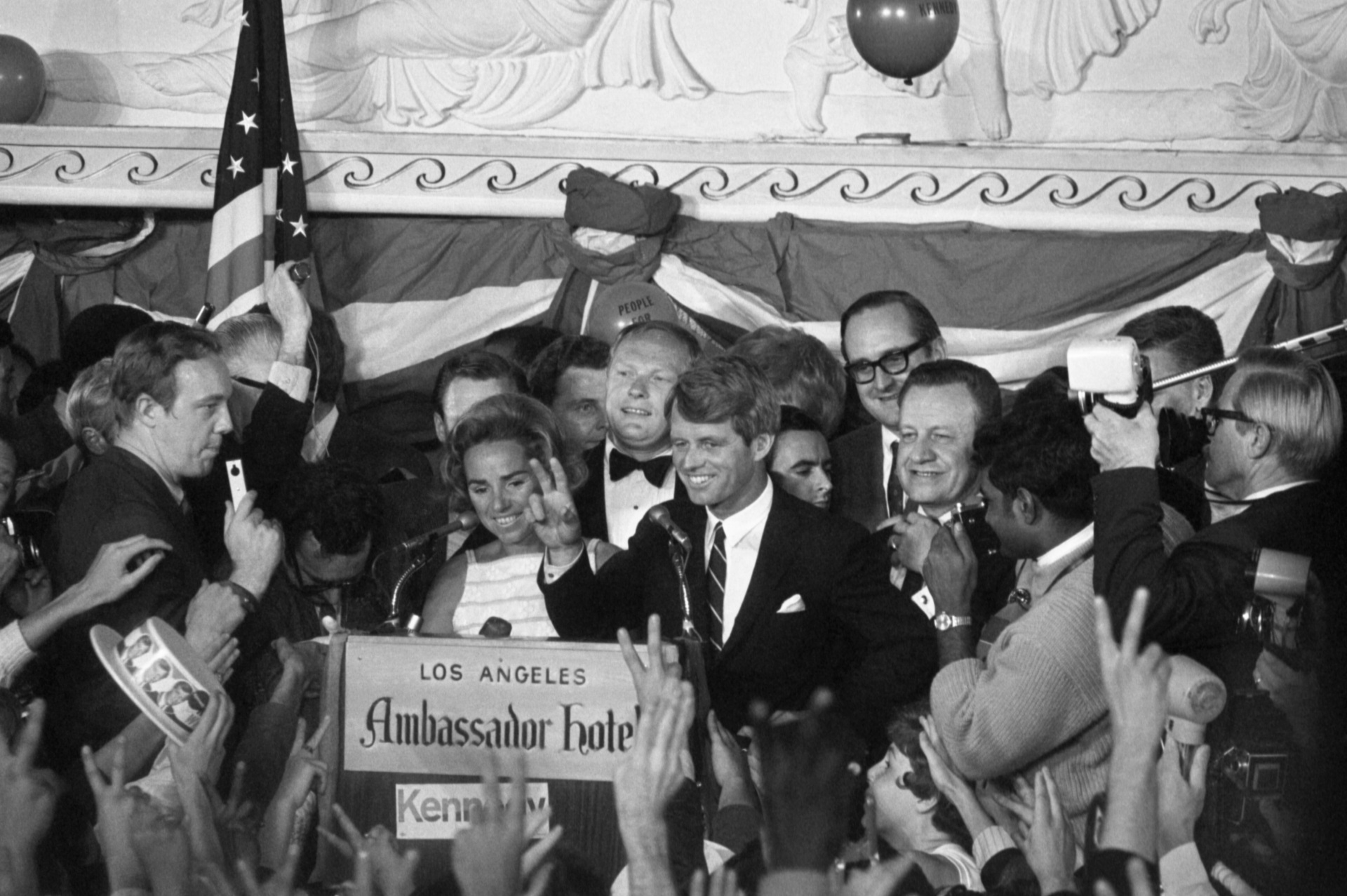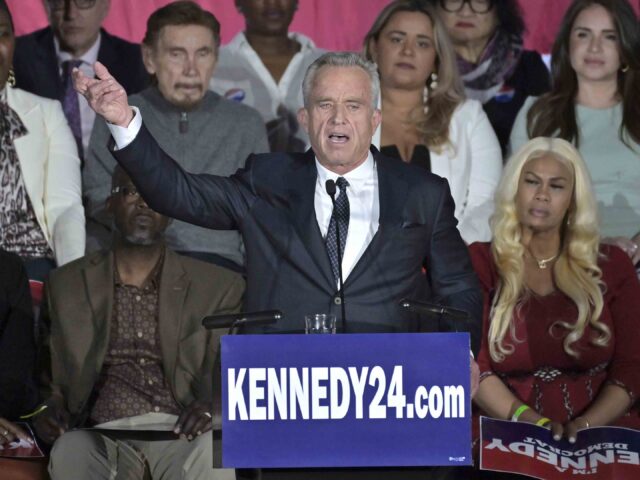Robert F. Kennedy Jr. lost his father when he was 14 years old. The senior RFK was assassinated by a crazed Palestinian in June 1968, just moments after winning the California presidential primary and securing a path to the Democratic Party’s nomination on an anti-war platform.

(Original Caption) Sen. Robert Francis Kennedy (D- N.Y.), his wife Ethel standing behind him, gives victory sign to huge crowd at the Ambassador Hotel June 5th, prior to making victory speech after winning the California primary. A few minutes later, the 42 year old Senator was brought down by an assassin’s bullets upon entering a hotel corridor. The accused assassin, 24 year old Jordanian refugee Sirhan Bisara Sirhan, was captured immediately by members of Sen Kennedy’s staff and turned over to Los Angeles authorities.
RFK, “ruthless” in his pursuit of communists and the mob, had won respect as a civil rights leader, a rare white politician who could speak credibly to black voters.
Another Kennedy killed — and it was the second major assassination that year, after that of Martin Luther King Jr. It marked the end of an age of utopian idealism. The inner cities were engulfed in riots that left many black neighborhoods in a state of collapse from which they have not yet recovered.
Stagflation, Watergate, Middle East wars, terror, financial crisis, and division followed, interrupted only by the optimism of the Reagan era.
It took Donald Trump to remind America in 2016 that it had a past to be proud of — but it may take another Kennedy to rally Americans behind a common understanding of what that past really meant.
Not the strained conformity of the 1950s, which Democrats claim Republicans want to restore, but the cultural dynamism of the 1960s at their best, when freedom expanded; culture flourished; and America reached, literally, for the moon.
Robert F. Kennedy Jr. understands his father’s legacy — but he is his own man. He has built a life largely on the margins of political debate, known for his opposition to vaccination policies and his dogged environmentalism. An easier path would have been to avoid controversy and to coast on the family’s credentials.
He has spasmodic dysphonia, which affects his voice. That has not silenced him, but censorship by social media companies has.
It is that common concern about censorship that led some Republicans to take notice of Kennedy, even before he announced his candidacy.
When the Republican-led House Weaponization Committee looked into Twitter’s collaboration with the Biden administration to censor free speech, which Democrats rather ludicrously tried to deny, it focused on a tweet by Kennedy about the coronavirus vaccine that the White House wanted suppressed.
Kennedy’s launch speech last week also impressed some conservatives. He did not trash Trump, or his voters.
In fact, Kennedy used some Trumpian themes — “Americans first” — in his pitch. He credited Trump with the right motivations to help the country, but faulted Trump for a lack of will to confront the Deep State. He opposed the war in Ukraine — not because of why the U.S. supported it, but because of what it had become.
I interviewed Kennedy on Breitbart News Sunday. The interview was scheduled to last twenty minutes; it ran for forty.
LISTEN + SHARE my interview last night with @joelpollak where we discuss key priorities of my campaign. #Kennedy24 https://t.co/1KDBAimTOE
— Robert F. Kennedy Jr (@RobertKennedyJr) April 24, 2023
I asked him what he believed he could do to end the divisions in the country. He said simply that he would tell the truth about what is happening in America — a remarkable response, Scott Adams noted, because so much of our political discourse is built upon the lie that other Americans are the source of our problems.
I challenged him on his left-wing environmental views: if he believed in room for dissent on vaccines, what about dissent on climate change?
He did not disagree — though he has made strident remarks in the past — but argued the free market is the answer. When property rights are properly assigned and firms must internalize environmental costs, the environment thrives. Crony capitalism deflects the costs onto nature and the public.
There were other issues we did not have time to explore: his policies on the border, for example, which is the single most consequential and visible failure of the Biden administration.
Will Kennedy reach beyond the empty pieties of his party and make the point — once obvious to both sides — that a diverse and tolerant society is a luxury only enjoyed behind strong borders?
If so, he has a tough road ahead. But he is used to such fights.
The conservative case for Kennedy is not just that he can weaken an incumbent Democrat — as his uncle, Sen. Ted Kennedy, did in 1980. It is that he is the strongest challenge to the woke mob running his party.
His father, meeting radicals in 1968, lamented: “It’s psychological with so many of them. I can’t be their psychiatrist.” His dream did not require America’s destruction.
Perhaps Robert F. Kennedy Jr. can fulfill that enduring potential.
Joel B. Pollak is Senior Editor-at-Large at Breitbart News and the host of Breitbart News Sunday on Sirius XM Patriot on Sunday evenings from 7 p.m. to 10 p.m. ET (4 p.m. to 7 p.m. PT). He is the author of the new biography, Rhoda: ‘Comrade Kadalie, You Are Out of Order’. He is also the author of the recent e-book, Neither Free nor Fair: The 2020 U.S. Presidential Election. He is a winner of the 2018 Robert Novak Journalism Alumni Fellowship. Follow him on Twitter at @joelpollak.

COMMENTS
Please let us know if you're having issues with commenting.